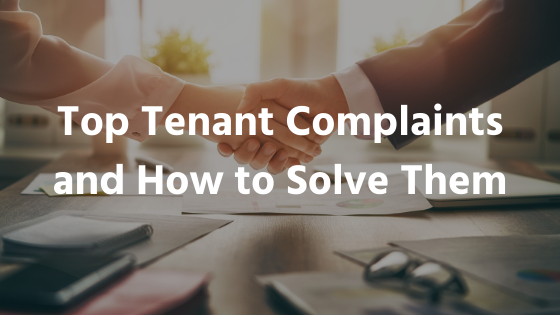As a property owner, you’ve likely dealt with tenant complaints.
Being a landlord isn’t all about collecting rent at the end of every month. Dealing with tenant issues is another big responsibility when managing your rental properties.
Tenant complaints are unavoidable, yet they can also severely impact your cash flow. If your tenants aren’t happy, then they’ll be less likely to renew their lease agreements for another term. And the last thing you want is to begin the marketing and re-renting process all over again.
Luckily for you, in this post, we will outline the top tenant complaints and offer solutions to them! Generally speaking, tenant complaints fall under four categories: noise complaints, maintenance issues, pest infestations and pet problems.
Let’s look at these complaints in more detail!
1. Noise Complaints
First and foremost, your tenant has a right to the quiet and peaceful enjoyment of their rented premises. And noise disruptions are a violation of this fundamental right.
So, what exactly should you do if you get the complaint from your tenant? First, consider encouraging the tenant to speak with the neighbor causing the unnecessary disturbance. In most cases, the two parties should be able to solve the issues amicably. But if that’s not possible, then your intervention will be necessary.
Now, there are two ways to go about handling this situation:
- If the neighbor is your tenant, then the situation will be easy to handle. That’s because all you’ll need to do is refer to the appropriate clause in your lease agreement.
- If the said neighbor isn’t your tenant, you may even need to involve the relevant local authorities.
2. Maintenance Issues
Maintenance issues are one of the most common types of tenant complaints. As a landlord, you have a responsibility to ensure your rental home adheres to the state’s habitability laws. Equally, your tenant has a responsibility to notify you when maintenance issues crop up.
Once you receive a maintenance call, the first thing to do is visit the property yourself. Although a tenant may be able to provide a description of a maintenance issue, they may not be able to pinpoint the root cause of the problem.
Before entering your tenant’s premises, make sure to notify them beforehand. Under Florida law, landlords must give their tenants a notice of at least 12 hours prior to entry. (Florida Statute 83.53(2)). The entry times must also be reasonable. Unless otherwise stated in the lease or agreed to by the tenant, it should be between 7:30am and 8:00pm.
Once you understand what the maintenance issue is, be sure to act promptly and conduct the proper maintenance or repair.
3. Pet Complaints
Most pet complaints are dog-related, such as feces, barking and aggressive behavior.
If there are pet complaints due to a barking dog, issue the neighbor written warnings. If that fails, then consider asking the tenant to remove their dog, or evict them from the rental. Although evicting a tenant should be the last resort, it is better to lose one difficult tenant than to lose several good ones.
When it comes to feces, begin by bringing up the issue with the pet owner. If that fails, then consider referring to the terms of the lease agreement. However, if the person isn’t your tenant, then refer them to the city bylaws on the issue.
If the issue is about an aggressive dog, you have to deal with it rather quickly. Remember, you’re responsible for your tenants’ safety. If the owner doesn’t take corrective measures immediately, issue written warnings or get in touch with local authorities.
4. Pest-Related Issues
Naturally, most renters will be afraid of, or disgusted by, pests in their rental unit. Pests can include spiders, snakes, bugs, insects and rodents.
As a landlord, it’s your responsibility to prevent any pests that disrupt your tenants. It’s not only a legal requirement, but it is also a smart financial move. When your property is pest-free, you’ll likely have happy tenants and low turnover rates.
That said, if your tenant doesn’t take out the trash and always leaves food out, then they will become responsible for the pest control. This is especially true if the lease requires them to maintain a clean and sanitary unit. Otherwise, the responsibility of handling pest infestations is solely yours.
To minimize pest infestation problems, inspect your property regularly. Ideally, do so once every few months.
Here is a checklist to help you in this regard:
- Clean up common and outdoor areas if there is clutter or trash.
- Make sure the sump pump is working.
- Ensure garbage bin lids are closed.
- Seal any cracks in walls, floors, or the foundation.
Bottom Line
Knowing how to handle tenant complaints is key to running a profitable rental investment. When your tenant makes a complaint, make sure you listen carefully, show genuine concern, and take appropriate action immediately.


